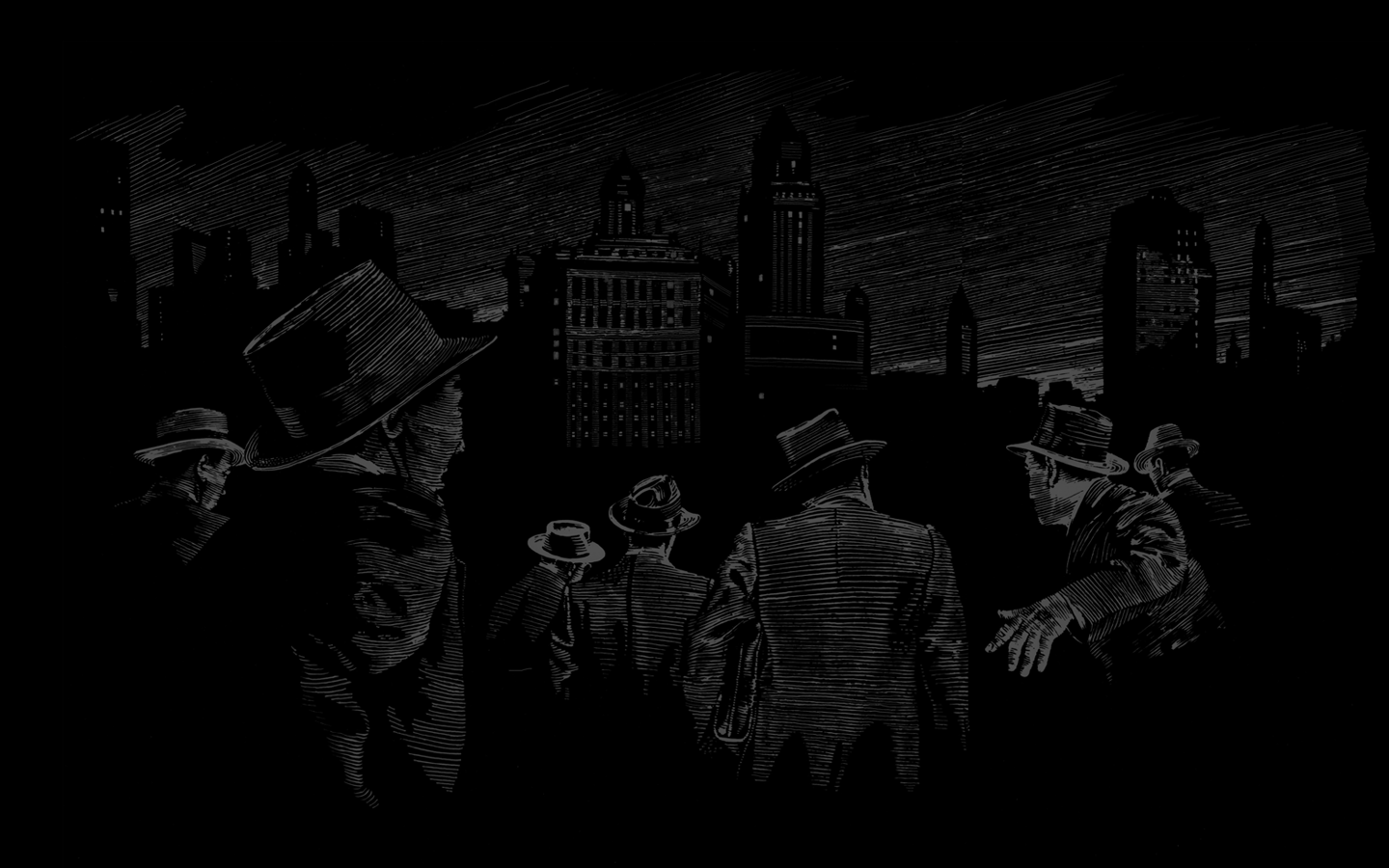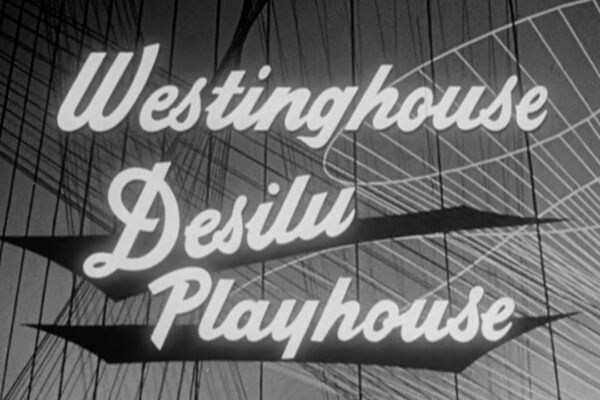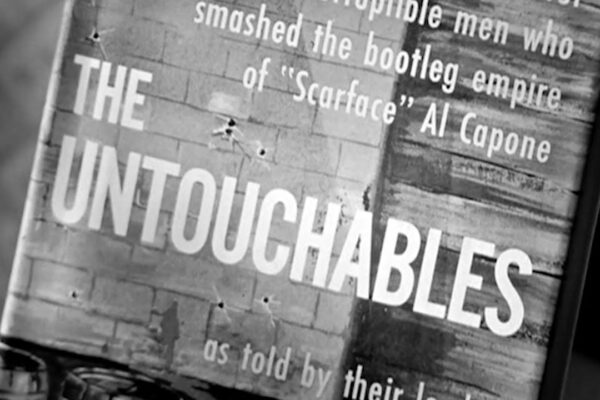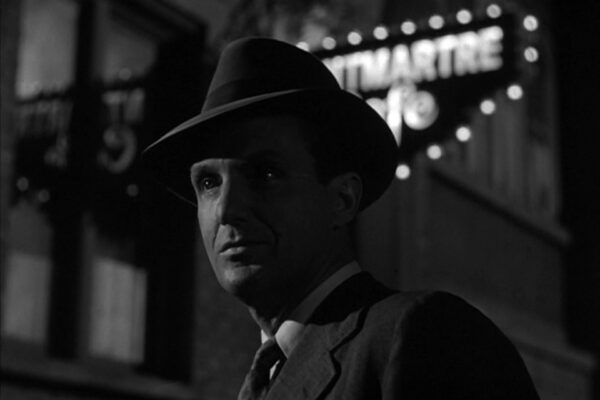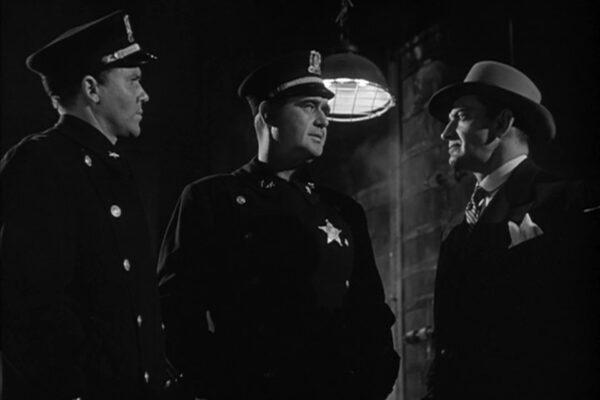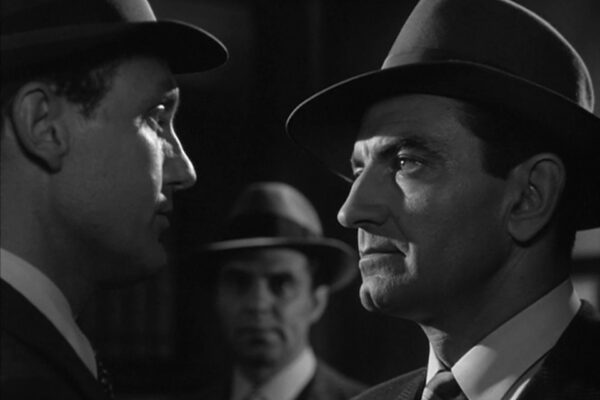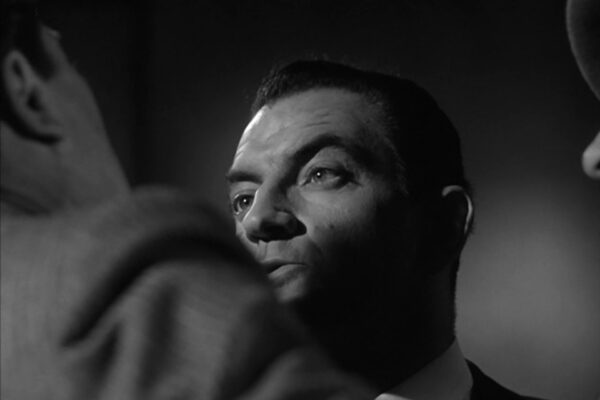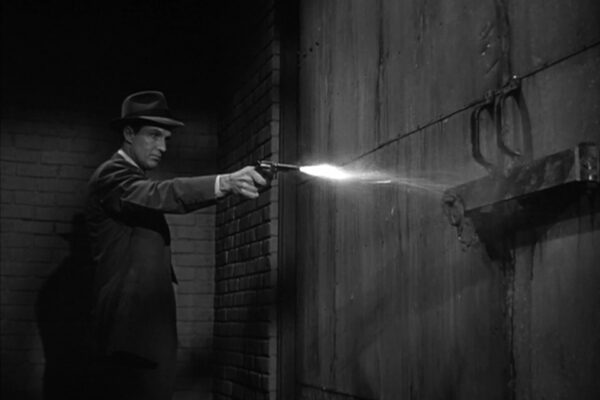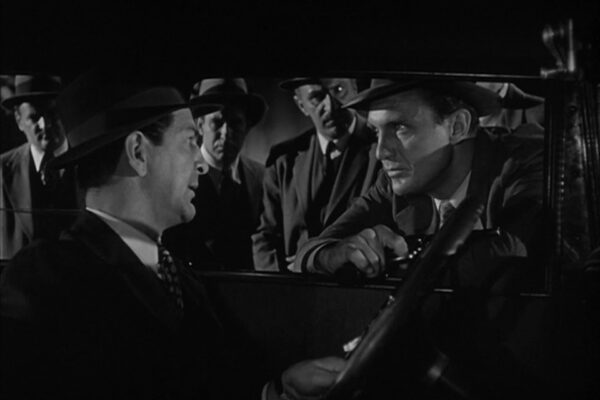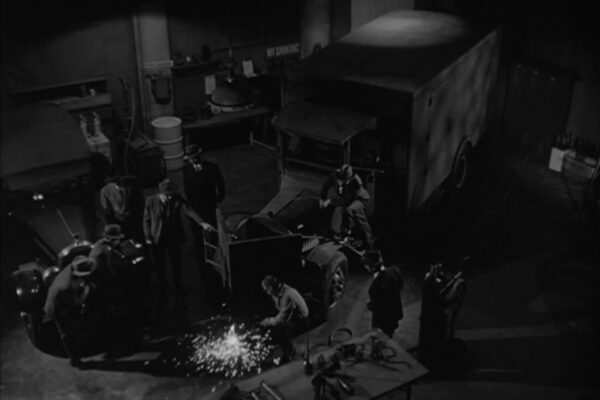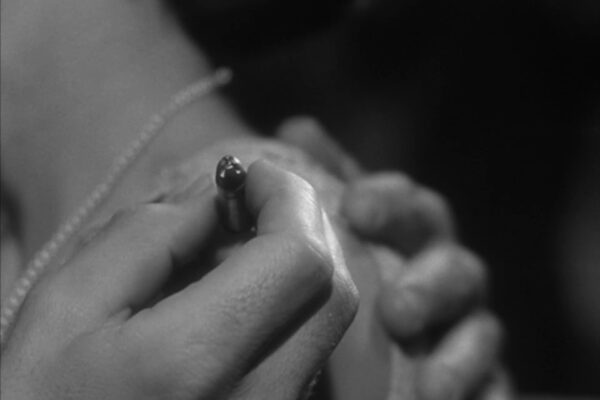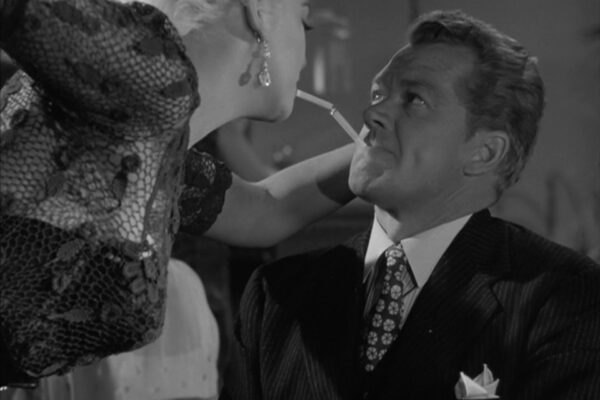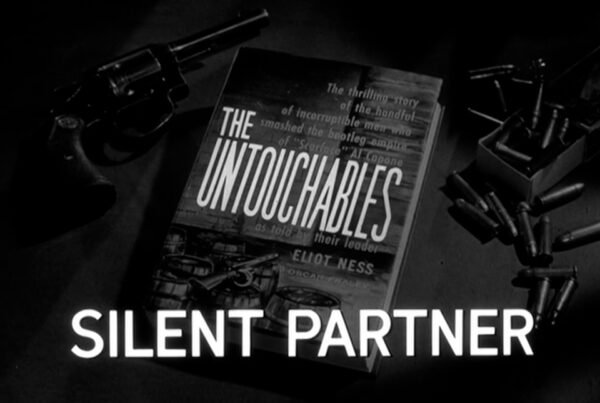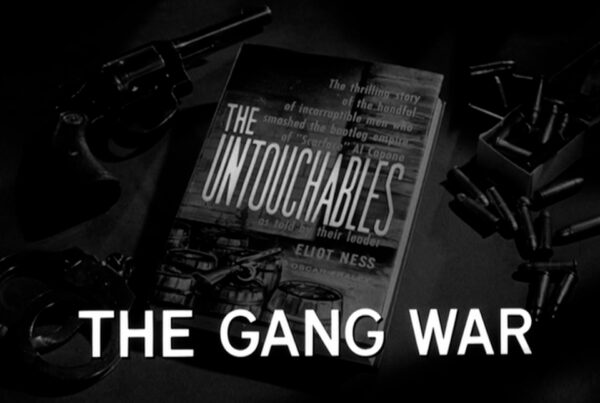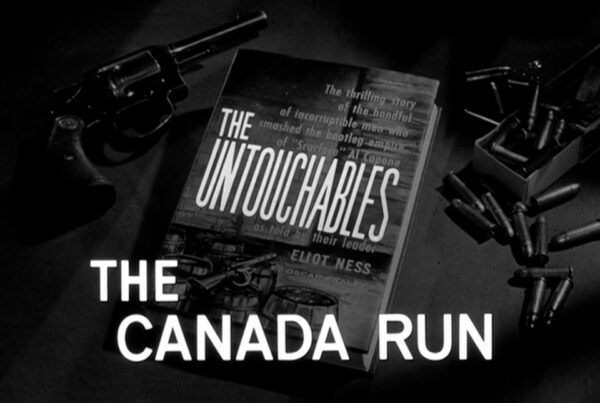THE UNTOUCHABLES (PART 1)
Airdate: April 20th, 1959
Written by Paul Monash
Based on the novel by Eliot Ness and Oscar Fraley
Directed by Phil Karlson
Director of Photography Charles Straumer
Music by Wilbur Hatch
Narrated by Walter Winchell
Produced by Quinn Martin
Executive Producer Bert Granet
Starring Robert Stack, Keenan Wynn, Barbara Nichols, Pat Crowley
Special Guest Star Neville Brand
“Chicago, 1929. By law the country was dry. Through connivance with Al Capone, Chicago was wet. Even now, while Al Capone served a short term for carrying a gun in Philadelphia, the organization functioned smoothly, helped by corrupt officials and a public that was indifferent. Social headquarters of the mob was the Cafe Montmartre. This night, the night of June 17th, 1929, the gang was to encounter its chief adversary: a Prohibition agent named Eliot Ness.”
Following a failed raid on the Club Montmartre, Eliot Ness (Robert Stack) realizes that a way to combat Capone’s corruption of law enforcement officials is to assemble a special squad group of Federal agents from around the country that are reliable, courageous, dedicated, and honest. Ness hand selects seven men: LaMarr Kane, Eric Hansen, Martin Flaherty, Jack Rossman, William Youngfellow, Tom Kopka, and Joe Fuselli, a reformed ex-convict. Sensing the squad is nothing more than talk, Frank Nitti and a corrupt Alderman layout extra dough among their police protection to make sure it stays that way.
After the raid, Capone thug Johnny Giannini arrives to strike a deal with Ness and his men. During the meeting, Ness and Fuselli bluff Giannini for more money than the mob is offering, forcing Giannini to call in enforcer Frank Nitti (Bruce Gordon). As they push for a payoff of a grand a week, one of Nitti’s men pulls a knife on Ness. Nitti relents and pays out. Ness immediately turns the money over to the Federal District Attorney Beecher Asbury and proceeds to raid six more Capone distilleries.
A desperate Giannini begs Ness to stop the raids, to which Ness threatens him with arrest unless Giannini gives up the location of a Capone brewery — a bigger prize for Ness. Ness and his men storm the brewery, only to be confronted with steel reinforced doors, giving the valuable brewers time to escape. Moments later, Rossman arrives with the news that Giannini managed to escape town after giving up the brewery, but had been assassinated by a shotgun blast to the head.
The squad outfits a confiscated 5-ton truck with a shield to easily breach brewery doors and the hunt for additional Capone operations picks up. Upon locating another brewery, the truck blasts through the doors with ease and Ness takes an ax to a beer vat in victory.
While Nitti weighs whether or not to kill Ness, George Ritchie (Joe Mantell) approaches Ness with an offer to join the squad in an attempt to impress his wife, burlesque dancer Brandy LaFrance (Barbara Nichols), who also happens to be the niece of Capone treasurer Jake Guzik. Bemused by the offer, Ness accepts.
On a date with girlfriend Betty Anderson (Patricia Crowley), Ness proposes, only to later discover a dumdum bullet has been left on their table. A signature of the Capone gang, the bullet is designed to tear a hole in its victim. The bullet is a warning.
Spurred on by the threat, Rossman and Ness plan to wiretap the phone at the Montemarte. Ritchie arranges for Flaherty to infiltrate the Capone headquarters and use the mob’s phone, giving Rossman a way to identify which line is Capone’s.
The wiretap pays off, allowing the squad to double their efforts in crippling the mob’s illicit enterprise to the tune of three million dollars in damages – but the decision on whether or not to kill Ness has been left up to Capone, who has just returned to Chicago to cast the deciding vote.
REVIEW
It’s difficult to watch The Untouchables without comparing it to the series that would eventually follow, but it is perhaps more important to first view it in context: The Untouchables was about as big a thing that Desilu Playhouse – or anyone else – was putting on television at the time.
You can learn how Desilu arrived at the decision to produce The Untouchabes in this episode of our podcast and in Chapter 1: Desiluland.
Compared to Desilu Playhouse’s modestly staged Lucy-Desi Comedy Hour and the Time Element (the latter of which would eventually give rise to The Twilight Zone), The Untouchables is what half a million bucks in 1959 bought you. A top-of-the-line film noir director in Phil Karlson, an Academy Award-nominated star in Robert Stack and Golden Globe winner Patricia Crowley, the tobacco barked narration of Walter Winchell, and a back lot of nightclubs, vintage cars, and breweries in sound-stages. It was motion pictures for television in prime time in a way that had never been done before. The Untouchables netted over 36 million viewers, coming in just a million shy of beating out Gunsmoke, the number one television program on the air at the time.
What’s perhaps most notable about the Playhouse rendition of The Untouchables is how closely it eschews to Eliot Ness’ autobiography and historical fact, especially when compared to the various retellings of the Ness/Capone saga throughout history. It is still the most true-to-history telling of events we have.
Remarkable is that this hour serves as the genesis for everything the series would eventually become: from the prominent featuring of Eliot Ness’ book in the Desilu Playhouse intro, the use of optical wipes and transitions, Winchell’s narration, Charlie Straummer’s black and white film noir compositions, and Robert Stack’s taciturn Eliot Ness.
What’s perhaps missing most is Nelson Riddle’s theme music, though Wilbur Hatch does a respectable job. Hatch would later be asked to contribute additional music to the series in 1963 for its Fourth Season and all besmirch his own name in the process. More on that later.

The good guys are lensed the same way you’d frame and light gangsters in a film noir – giving them equal footing with Chicago’s underworld.
For respected film noir director Karlson and cinematographer Straummer, this was also the rare and challenging opportunity to stage and frame the good guy as if this were a gangster drama focused on the bad guys from decades previous. When Ness, Kane and Fuselli press Giannini and Nitti for more money, they treat Giannini as if they’re deadpan guns-for-hire instead of honorable Prohibition agents.
“We’ve got to have more money, Johnny,” drips Kane as Ness and Fuselli look on.
- Johnny Giannini gets roughed up as two shadows look on.
- Charlie Straummer’s imposing framing of Nitti.
- Straummer’s stagged framing of characters would become another series hallmark.
Highlights of this hour include the unspoken rapport between Ness and Fuselli as their exchanges do well to suggest a long, unspoken history. Likewise, Patricia Crowley absolutely glows in her portrayal of Elizabeth Anderson and she brings a charming, playful warmth in her brief scenes. While Patricia was never consulted on whether they’d utilize her character into the series, it seems an unfortunate omission to know we’ll never see the future Mrs. Eliot Ness beyond the Desilu Playhouse.
Also conspicuous are cameos by numerous actors who will resurface on the series like Joe Mantell, whose pathetic George Ritchie is both endearing and naive. (“Are you sure you don’t want to do anything else to impress your wife, like joining a trapeze act or playing Russian roulette?” asks Ness.) Also in the rogues gallery are Paul Picerni and Nicholas Georgiade, playing gangsters and thugs instead of the Federal men they’ll portray as regulars on the show later.
While Bruce Gordon’s Frank Nitti is not yet the character we’ll come to know-and-love on the series, he principally plays the same role as the villainous heavy until Capone’s return. When viewed in the context of Ness and Nitti’s four-season long standoff in the series, it’s delightful to think that this, in Desilu-canon, is the first time they meet and that Nitti nearly succeeds at letting a gunsel knife Ness in the back.
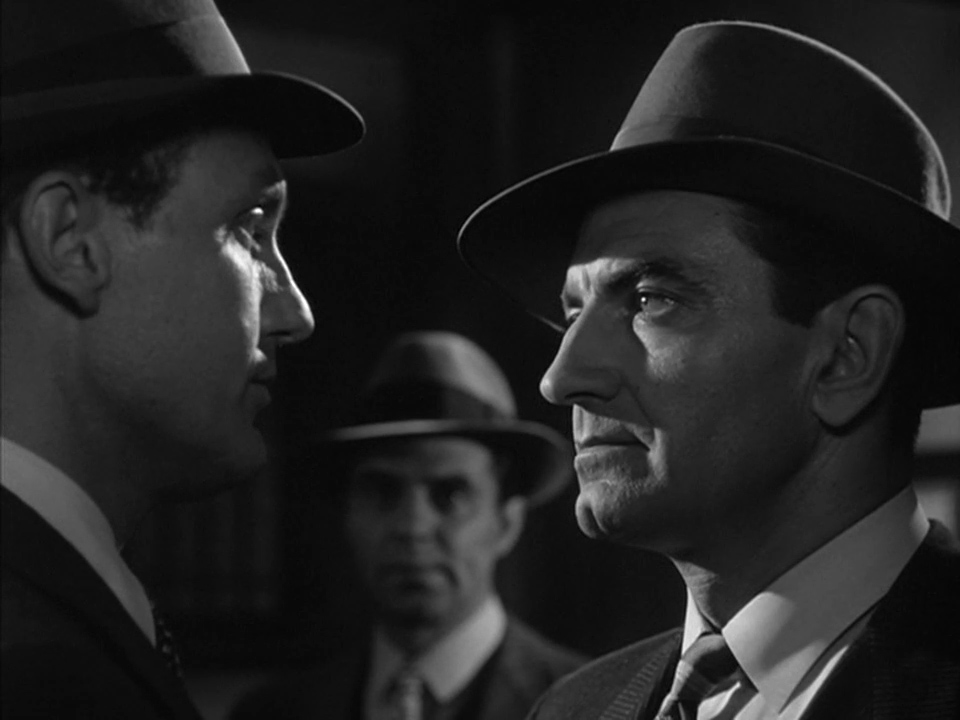
The beginning of Ness and Nitti’s four-year romance. Paul Picerni (in back) portrays Tony Liguri long before he’ll show up in the Second Season as agent Lee Hobson.
By today’s standards, the hour also represents some deliberate choices (some would call them shortcomings) that would become self-imposed limitations. We never learn what motivates Eliot Ness, or why he recruits former criminal Joe Fuselli to the team, and we learn nothing about Ness’ men beyond what Winchell tells us. In the same way the series would have Winchell rattle off distinctive characteristics and origins about its gangsters-of-the-week, his summary of Ness’ men here is the root of what Quinn Martin would call “Untouchables-style.” Part 1 is also relatively violence-free, but with Capone’s return at the end of hour, the heat will turn up.
Overall, Ness’ dogged persistence seems borne out of pure indignant righteousness more than anything else. There is no moral grandstanding in this hour – a brewer calls the law “stupid,” Winchell ticks off lines about the public’s general apathy, and Ness and Betty enjoy cherries jubilee with rum and brandy. (“Maybe it’s legal? Pre-war, ” she appeals.) This is all likely thanks to producer Quinn Martin, who was more invested in entertainment than messaging.
Stack’s acting choices would also help form the framework for the series – this was not a hero prone to scenery chewing or soliloquies. His decision to underplay Ness was a brave one for an actor who had just been nominated for his performance as a brash, melodramatic alcoholic in Written on the Wind (1956). Perhaps more fascinating is knowing that his Eliot Ness is a composite of the three bravest men Stack had ever known – including Medal of Honor winner Audie Murphy – all of whom were quiet men of strength and action. Click here to learn more about Stack’s choices and the inspiration behind them in our podcast.
In a way, Winchell’s narration asks that we not ponder the moral or emotional state of our hero – but instead to know that he was a real-life good guy trying to uphold the law in a lawless time and that this is his story. The archetype of the dogged, Untouchable Eliot Ness is being molded right beneath our eyes.
For viewers in 1959, the mention of Chicago, Prohibition and Capone were all shorthand for a turbulent time of good-versus-evil, and now finally audiences had their good guy, too.
And Desilu was about cement this conviction. Click here for our recap of Part 2 of The Untouchables.
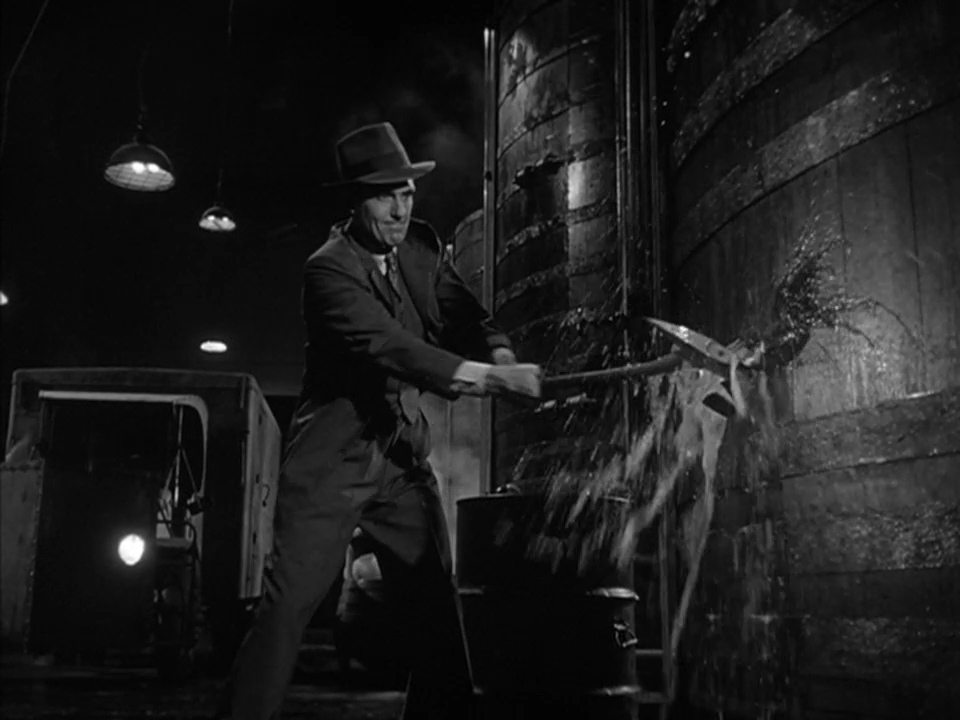
The archetypal image of Eliot Ness.
OBSERVATIONS
• Robert Stack’s trademark grey three-piece suit which he’d inhabit for four years on the series is still a few months and one wardrobe department away. When Stack showed up for rehearsals, his suit had been tailored to Van Johnson, an actor who had previously almost been cast as Ness. It appears the ill-fitting jacket stayed that way throughout production.
• Neville Brand’s accent is pretty bad and also unnecessary – the real Capone didn’t have one.
• The Untouchables would be released theatrically abroad later that year and in 1962 as The Scarface Mob.
• It’s hard to see, but when the squad gets their first chance to use their battering ram of a 5-ton truck, Youngfellow is seen in an altercation in the background with two mobsters who were in a lookout vehicle. A promotional still of Youngfellow fighting one of these men wound up on a paperback version of The Untouchables novel, but the scene itself has been edited from the final cut.
QUOTES
NITTI: “How much do you want to lay off our stills?”
NESS: “We want a grand a week.”
NITTI: “You cops, you get more dough out of this than we do.”
NESS: “Okay, so become a cop.”
BETTY: “I wish we had champagne.”
NESS: “So do I, but it’s my business to see that we don’t.”
BETTY: “What a business.”
HISTORICAL NOTES
• Historians generally agree that Desilu Playhouse telling of The Untouchables eschews closest to Ness’ book and the historical reality its based on. While the names of Ness’ men are mostly changed, they were in reality Joe Leeson, Lyle Chapman, Sam Seager, Warren Stutzman, Paul Robsky, Marty Lahart, Barney Cloonan, Marion King, William Gardner, among others that came and went over time. Fuselli is a based on Frank Basile, an ex-con that worked as an informant for Ness prior to the squad being formed.


